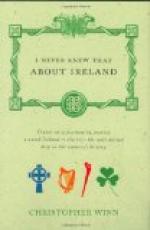The prospect seems too good to be true. Were we to follow after it and put the loyal Protestant minority into the power of the anti-imperial Catholic majority in the hope of seeking peace and ensuing it, we might perchance be like the dog who let fall that piece of meat from between his teeth—losing the substance for shadow. We do better, all things considered, with our present arrangements—trusting to the imperfect operations of human law rather than shooting Niagara for the chance of the clear stream at the bottom.
The whirligig of Time has changed the relative positions of the two great parties in Ireland. Formerly it was the Catholics who desired the abolition of Home Rule, and the Protestants who held by the National Parliament. That Parliament was exclusively Protestant, and the powerful minority ground the helpless majority to the very ground. Catholics were persecuted from shore to shore, and all sorts and conditions of Protestant bullies and tyrants sent up petitions to forbid the iniquity of Catholic trade rivalry. What was then would be now—changing the venue and putting the Catholics where the Protestants used to be. We do not believe that the “principle of Nationality” is the working power of this desire for Home Rule, as Mr. Stansfeld asserts—unless indeed the principle of Nationality can be stretched so as to cover the self-aggrandizement of a party, the bitterness of religious hatred, and the tyranny of a cruel and coercive combination. The grand and noble name of Nationality can scarcely be made so elastic as this. Respect for law lies at the very heart of the principle, and the Irish Home Rulers are of all men the most conspicuous for their contempt of law and their bold infraction of the very elementary ordinances of civilized society.
As for tyranny, no coercion established by Government—not even that proclaimed by Mr. Gladstone—has been more stringent than the coercion exercised by the Plan of Campaign. What happened in Tipperary only the other day when certain rent-paying tenants, who had been boycotted, did public penance in the following propositions? They offered:—“Firstly, to come forward to the subsequent public meeting and express public contrition for having violated their resolution to hold out with the other tenants; secondly, not to pay the next half-year’s rent, due on the 10th of December, but to in future act with the general body of the tenantry; and thirdly, to pay each a pecuniary sum, to be halved between the Ponsonby




